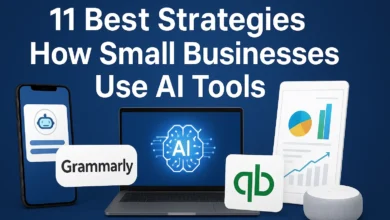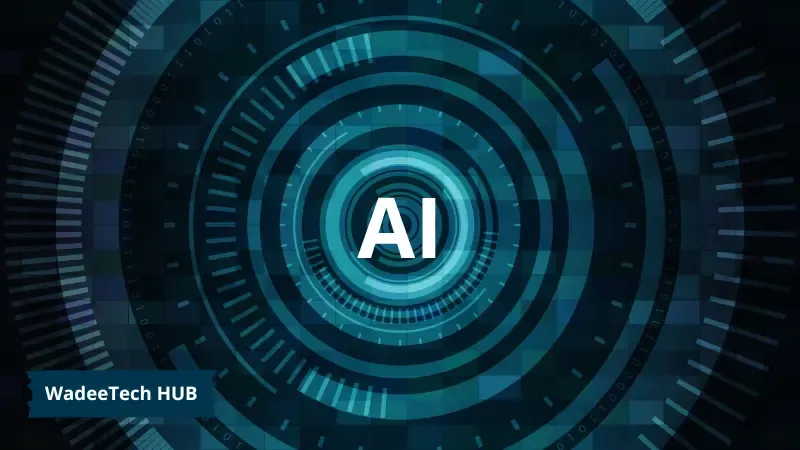How AI is Changing Fintech?

The financial technology sector (fintech) is undergoing a historic transformation, and at the center of this change is artificial intelligence (AI). For business owners, understanding how AI is changing fintech is not only a matter of curiosity but a crucial factor in staying competitive. From automating customer service to predicting financial risks, AI is redefining how financial services operate.
This article explores the impact of AI on fintech, addressing key questions business leaders often ask and offering insights into what lies ahead.
AI’s Role in Fintech: Driving Innovation and Efficiency
Artificial intelligence is no longer a futuristic concept—it is the engine behind many of the latest fintech innovations. Companies use AI to process data at lightning speed, uncover hidden patterns, and deliver personalized financial solutions. For entrepreneurs, this means access to smarter tools for managing money, investments, and customer relations.
Key Drivers of AI in Fintech:
- Automation of Operations: AI reduces manual processes, cutting costs and increasing efficiency.
- Data-Driven Decisions: Algorithms analyze customer behavior to provide tailored services.
- Fraud Detection: AI identifies suspicious activities faster than traditional systems.
Summary: AI is the backbone of modern fintech, offering cost savings, efficiency, and better customer experiences.
How Is AI Changing Fintech?
AI is reshaping fintech by transforming how businesses interact with customers and manage financial risks. According to a Deloitte survey, over 60% of financial service leaders believe AI adoption will define the future of the industry.
Examples of Change:
- Chatbots and Virtual Assistants: Fintech apps now provide 24/7 support, reducing service costs by up to 30% (IBM report).
- Robo-Advisors: Platforms like Betterment and Wealthfront use AI to offer personalized investment strategies at lower fees.
- Credit Scoring: AI models evaluate creditworthiness using non-traditional data, making financing more accessible.
Summary: From customer service to credit scoring, AI is creating a more inclusive and efficient financial ecosystem.
How Is AI Going to Change Finance in the Future?
The future of finance will be even more AI-driven. As machine learning and predictive analytics evolve, businesses will gain tools to anticipate market shifts and minimize risks.
Future Shifts:
- Predictive Analytics: AI will forecast trends, helping businesses prepare for market volatility.
- Personalized Banking: Hyper-customized financial products will emerge, adapting to individual customer needs.
- Blockchain Integration: AI and blockchain together will enhance transparency and security in transactions.
Summary: Finance will become proactive rather than reactive, enabling businesses to seize opportunities faster and with greater accuracy.
The Evolving Role of AI in Shaping Financial Technology (Fintech)
AI plays multiple roles in fintech, from customer engagement to compliance. For business leaders, the benefit lies in AI’s ability to streamline operations while enhancing trust and security.
Core Roles of AI in Fintech:
- Risk Management: Algorithms assess real-time risks and suggest strategies to mitigate them.
- Regulatory Compliance: AI systems monitor transactions to meet complex compliance standards.
- Customer Insights: AI analyzes spending habits, offering businesses deeper insights into client behavior.
Summary: The role of AI in fintech extends beyond automation—it builds smarter, safer, and more customer-focused financial systems.
Is AI Good or Bad for the Fintech Industry?
Like any disruptive technology, AI brings both benefits and challenges. For business owners, understanding both sides is essential before adopting AI solutions.
Pros:
- Efficiency Gains: Cuts operational costs and increases productivity.
- Customer Satisfaction: Provides faster and more personalized services.
- Fraud Prevention: Protects businesses and clients with real-time monitoring.
Cons:
- Job Displacement: Automation may reduce the need for human roles.
- Bias in Algorithms: Poorly designed AI can lead to unfair outcomes.
- Security Risks: Cyberattacks targeting AI systems can compromise sensitive data.
Summary: AI is largely positive for fintech, but responsible implementation is critical to avoid risks.
Real-World Examples of AI in Fintech
To fully grasp how AI is changing fintech, it’s important to look at real applications:
- PayPal: Uses AI to detect fraud across millions of daily transactions.
- Square: applies advanced machine learning models to quickly assess credit eligibility and support financing options for small enterprises.
- JP Morgan: Its COiN platform processes 12,000 legal documents in seconds, saving 360,000 hours of work annually.
Summary: Leading fintech firms prove that AI is not just theory—it delivers measurable business results.
Key Benefits of AI for Business Owners in Fintech
For entrepreneurs and business leaders, adopting AI-powered fintech solutions can create significant advantages.
Top Benefits:
- Improved Decision-Making: Access to real-time financial insights.
- Cost Savings: Automated processes minimize reliance on extensive support staff.
- Scalability: AI tools can grow with your business without heavy overhead.
In summary: AI enables companies to grow more intelligently, optimize expenses, and enhance strategic decision-making.
AI Benefits vs AI Risks in Fintech
| AI Benefits in Fintech | AI-Related Risks in the Financial Technology Sector |
| Cost Reduction: Automation lowers operational expenses. | Job Displacement: Automation may reduce human employment opportunities. |
| Fraud Detection: Real-time monitoring prevents financial crimes. | Bias in Algorithms: Poorly trained models can lead to unfair or inaccurate results. |
| Personalized Services: Tailored banking and investment advice improves customer satisfaction. | Personalized Services: Tailored banking and investment advice improves customer satisfaction. |
| Faster Decisions: Predictive analytics enables quick, informed financial strategies. | Regulatory Challenges: Rapid AI adoption may outpace compliance frameworks. |
| Scalability: AI allows companies to expand operations efficiently without large increases in expenses. | High Implementation Costs: Advanced AI systems may require significant upfront investment. |
Summary: While AI offers tremendous opportunities for efficiency, personalization, and fraud prevention, businesses must carefully address risks such as security, bias, and compliance to maximize long-term benefits.
Key AI Use Cases in Fintech
| Practical Use | Description | Practical Example |
| Customer Service | Chatbots and virtual assistants provide 24/7 personalized support. | Bank of America’s Erica: assists millions of customers daily. |
| Risk Management | Machine learning predicts market risks and suggests strategies. | JP Morgan’s COiN: processes contracts and reduces legal risks. |
| Credit Scoring | AI analyzes traditional and alternative data to assess borrower credibility. | Square: offers instant credit assessments for small businesses. |
| Investment Advisory (Robo-Advisors) | AI-driven platforms provide low-cost, tailored investment advice. | Betterment & Wealthfront: deliver personalized portfolios. |
Summary: These use cases highlight how AI is embedded across fintech, from fraud prevention to investment guidance, proving its value for both businesses and customers.
Conclusion: Why Business Leaders Should Care
Adopting artificial intelligence has become essential, serving as the driving force behind the fintech revolution. For business owners, understanding how AI is changing fintech means preparing for a future where financial decisions are faster, safer, and more tailored. Although there are challenges to consider, the potential benefits significantly surpass the associated risks.
By adopting AI-driven fintech solutions today, businesses can improve efficiency, protect themselves from fraud, and deliver superior customer experiences. The key to success lies in responsible adoption—balancing innovation with ethical and secure practices.
Final Takeaway: For entrepreneurs, embracing AI in fintech is not just about keeping up with trends—it’s about leading in a new era of smart, data-driven finance.
Frequently Asked Questions (FAQ) – How AI is Changing Fintech?
-
How is Artificial Intelligence improving efficiency and customer experience in financial technology?
Artificial Intelligence (AI) plays a crucial role in transforming financial technology (fintech) by automating repetitive tasks, reducing operational costs, and enabling 24/7 customer support through chatbots and virtual assistants. By analyzing customer behavior, AI delivers personalized financial solutions, helping businesses improve customer satisfaction and streamline operations. Embracing AI ensures that fintech companies remain competitive while offering smarter, faster, and more reliable services.
-
What are the main risks of implementing Artificial Intelligence in financial technology?
While AI provides significant benefits, businesses must be aware of potential risks in the financial technology sector. These include job displacement due to automation, biases in AI algorithms leading to unfair decisions, and security vulnerabilities that could expose sensitive financial data. Responsible AI adoption with proper monitoring and ethical considerations is essential to minimize these risks and fully leverage AI’s potential in fintech.
-
How does AI enhance fraud detection and risk management in fintech?
AI transforms financial technology by enabling real-time monitoring of transactions and predictive risk analysis. Algorithms can detect unusual patterns, flag suspicious activities, and suggest mitigation strategies faster than traditional systems. This capability is vital for fraud prevention, protecting both businesses and customers, while also helping financial institutions make informed decisions about lending, investments, and market risks.
-
Can you provide real-world examples of how AI is changing fintech?
Several leading fintech companies demonstrate the impact of AI on the industry:
PayPal uses AI to detect fraudulent transactions across millions of daily payments.
Square leverages AI for instant credit assessments, making financing more accessible to small businesses.
JP Morgan’s COiN platform processes thousands of legal documents in seconds, saving hundreds of thousands of work hours annually.
These examples highlight how Artificial Intelligence is not just a trend but a practical tool driving efficiency, security, and smarter financial decisions in fintech. -
What does the future hold for AI in financial technology?
The future of financial technology is increasingly AI-driven. Predictive analytics will allow fintech companies to anticipate market trends and minimize risks. Personalized banking will deliver hyper-customized products tailored to individual needs, while integration with blockchain will enhance transparency and security. For business owners, adopting AI in fintech is essential to stay competitive, improve operational efficiency, and lead in a data-driven, intelligent financial ecosystem.



